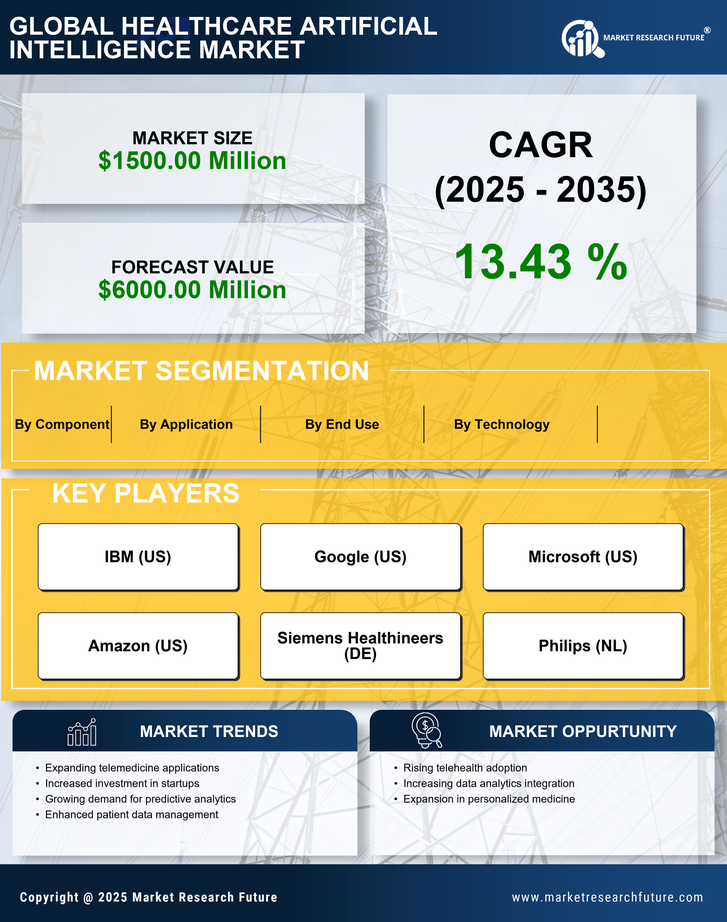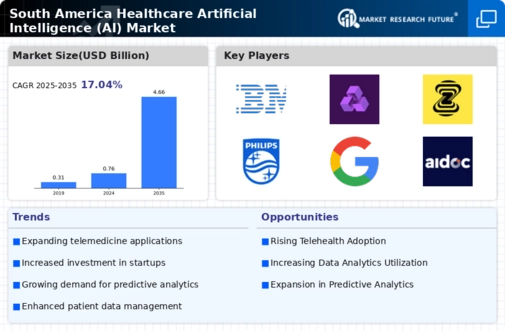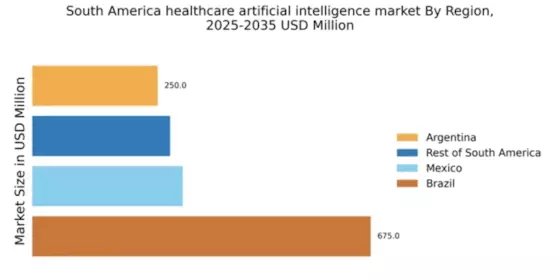Growing Healthcare Expenditure
The healthcare artificial-intelligence market in South America is bolstered by the rising healthcare expenditure across the region. As countries allocate more resources to healthcare, there is a corresponding increase in the adoption of advanced technologies, including AI. In 2025, healthcare spending in South America is projected to exceed $200 billion, with a significant portion directed towards digital health solutions. This trend indicates a growing recognition of the value that AI can bring to healthcare delivery, from improving diagnostic accuracy to streamlining administrative processes, thereby enhancing overall efficiency.
Government Initiatives and Funding
Government initiatives in South America are significantly influencing the healthcare artificial-intelligence market. Various national health policies are being implemented to promote the integration of AI technologies in healthcare systems. For instance, funding programs aimed at supporting AI research and development are becoming increasingly common. In 2025, it is estimated that government investments in AI healthcare solutions could reach upwards of $500 million. These initiatives not only enhance the technological infrastructure but also encourage collaboration between public and private sectors, fostering innovation and accelerating the adoption of AI in healthcare.
Rising Demand for Personalized Medicine
The healthcare artificial-intelligence market in South America is experiencing a notable shift towards personalized medicine. This trend is driven by the increasing recognition of the need for tailored treatment plans that cater to individual patient profiles. AI technologies facilitate the analysis of vast datasets, enabling healthcare providers to develop customized therapies based on genetic, environmental, and lifestyle factors. As a result, the market is projected to grow at a CAGR of approximately 25% over the next five years. This growth is indicative of a broader movement towards precision healthcare, where AI plays a pivotal role in enhancing patient outcomes and optimizing treatment efficacy.
Increased Focus on Operational Efficiency
Operational efficiency is becoming a critical driver for the healthcare artificial-intelligence market in South America. Healthcare providers are increasingly seeking ways to reduce costs and improve service delivery. AI technologies offer solutions that automate routine tasks, optimize resource allocation, and enhance patient management systems. By 2025, it is anticipated that AI-driven operational improvements could lead to cost savings of up to 20% for healthcare institutions. This focus on efficiency not only benefits providers but also enhances patient experiences, making healthcare services more accessible and effective.
Advancements in AI Algorithms and Technologies
The healthcare artificial-intelligence market in South America is witnessing rapid advancements in AI algorithms and technologies. Innovations in machine learning, natural language processing, and data analytics are enabling more sophisticated applications in healthcare. These advancements allow for improved diagnostic tools, predictive analytics, and enhanced patient monitoring systems. As of 2025, the market is expected to see a surge in AI applications, with a projected growth rate of 30% in algorithm-driven solutions. This technological evolution is likely to transform healthcare delivery, making it more proactive and data-driven.


















